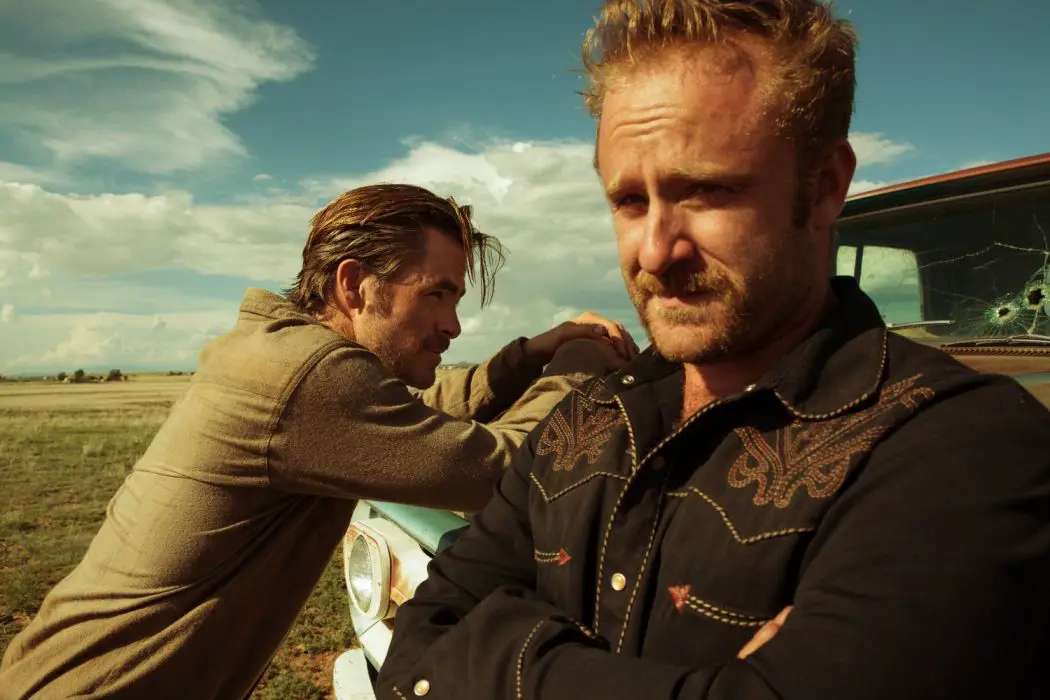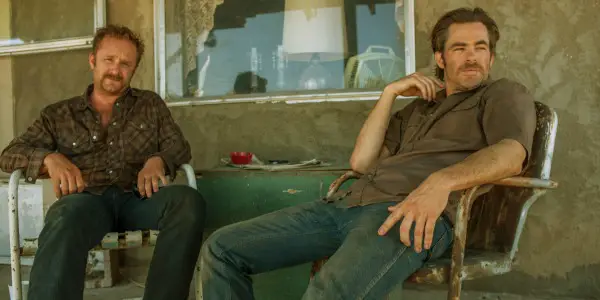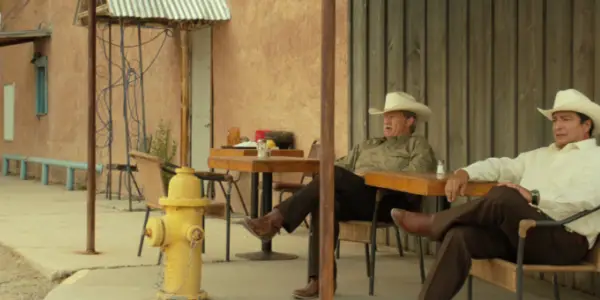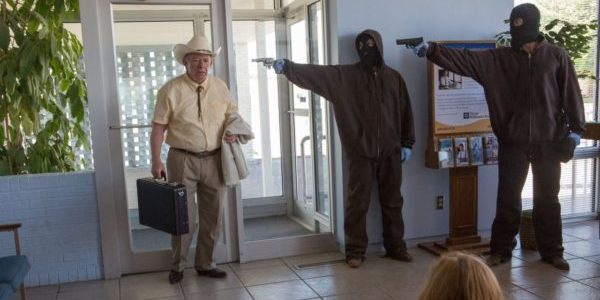HELL OR HIGH WATER: 2016’s Film Of The Year

I’m a scrappy, DIY New Yorker who fell in love…
This dusty gem of an outlaw picture almost passed me by, but I caught the trailer before Swiss Army Man (satisfyingly strange!) and immediately wanted – needed – to give it my money. If you had seen the trailer before whatever summer tent pole you supported, Hell or High Water would have opened nationwide and been the blockbuster you didn’t know you needed. It snuck from an opening weekend on 32 screens to an eventual wide release of 1,505 screens, more than doubling its budget without much marketing. Its award season run is now mimicking its sleeper release, so allow me to argue for Hell or High Water as the most important picture of 2016 – if not the best.
Two brothers, an ex con and a divorced dad, decide to rob multiple branches of the bank that holds the reverse mortgage on their childhood home, pay off the bank with the loot, and start a trust for the divorcee’s two sons. The ex con (Ben Foster) is a loose cannon but played and written so well that he believably walks the line. The father (Chris Pine) is the antihero (or hero?) of our tale. The ranch just struck oil, and he’ll be damned if the bank is gonna keep all of the profit off of his family’s black gold. Two aging Texas Rangers (Jeff Bridges and Gil Birmingham) pursue the duo across west Texas, trading barbs and talking about retirement.
No Bail Out For People Like Us
The movie opens on a once cool beater taking a sharp left as the camera tracks past graffiti on the wall of a parking lot. “3 tours in Iraq but no bail out for people like us,” it reads. Laced across this literary work of gravitas is the economic reality that reflects the concerns of a majority of Americans. We might be attempting to solve economic inequality and devastating poverty in drastically different ways, but we can still agree that the rich are getting richer while the poor get poorer.

As the Rangers stake out one the bank branches, Gil Birmingham looks around the no horse town and says, “150 years ago this was my ancestors’ land… til the grandparents of these folks took it, and now it’s been taken from them. Except it ain’t no army doin’ it. It’s those sons of bitches right there.” Birmingham sticks an accusatory finger out at the bank.
Chris Pine, who has always been a solid player, smolders like the stars of old in the quiet role of Toby Howard. He offers an explanation for his actions toward the end of the movie. “I been poor my whole life. My parents, their parents before them. It’s like a disease, passing from generation to generation, becomes a sickness. That’s what it is. Infects every person you know, but not my boys. Not anymore.” The ominous clack and clang of oil pump jacks punctuate this monologue as Pine debates whether to level his shotgun at his accuser or shake his hand.

Pine’s brilliant Robin Hood plan has unexpected and tragic consequences, but he accepts his actions and their reactions. He might not be the pure hero of yesteryear, but he’s the hero we need and want to succeed. His battle is honorable if not exactly fought with honor.
Cops & Robbers
Taylor Sheridan’s script is the foundation of this seemingly simple cops and robbers tale, and it is a chief example of how we can bring serious issues to light in, say, a heist movie while still entertaining. I can’t even fault Sheridan for including so few scenes with female characters as it only reminds me that there are no small roles in this play. The lack of acknowledgement during award season for most of this cast, excluding Jeff Bridges, seems a cruel oversight, but at least the Critics’ Choice Awards nominated the ensemble.
David Mackenzie’s direction flawlessly shifts from the one liners to the tense, gritty action sequences, and even to a heartbreaking loss in the final act, and I feel compelled to watch all of his work that I missed between Young Adam and now. He is adept at focusing on the real meat of the scene, even if the action is elsewhere. When Foster brings a stunning hotel clerk up to his shared room with Pine, the camera goes in for a close up of Pine, wide awake and with his shirt pulled over his ears, as his brother literally gets all of the action. There is a later moment where Pine wakes up Foster, and Foster reacts as if it’s a prison jump, hinting at the collective baggage from a life lived on the edge.

All of this is captured by cinematographer Giles Nuttgens with a mix of Ford epic and 70s crime thriller. The camera passes but never holds too long on the billboards advertising “Get Out of Debt Fast” and the For Sale signs where no one is buying. Economic depression is always just in the background, woven into the fabric of these forsaken towns and forgotten families.
Conclusion
Hell or High Water might have passed under the radar relative to Hollywood’s self-congratulatory La La Land, but when a movie plays as well in liberal coastal enclaves like Los Angeles as the conservative suburbs of Phoenix, we should take note that all is not lost. And maybe we the people can agree that it’s time to start robbing the rich to feed the poor.
What are your thoughts about Hell or High Water? Share below.
Does content like this matter to you?
Become a Member and support film journalism. Unlock access to all of Film Inquiry`s great articles. Join a community of like-minded readers who are passionate about cinema - get access to our private members Network, give back to independent filmmakers, and more.
I’m a scrappy, DIY New Yorker who fell in love with movies at a young age. My first short film is the award-winning "Feline Frenzy," which screened at festivals, and I’m developing an Appalachian Godfather tale called “'Shiner” for television. The “‘Shiner” pilot script was nominated to the 2016 #WriteHerList and made the Hot 100 of Capital Fund’s Screenplay Competition. Aside from writing and directing, I have long advocated for gender, racial, and LGBTQ parity and representation inside and outside of the film industry. To that end, I created and run Cinefemme's Dinner with Dames as the Program Director. More information at www.jennapayne.com.













